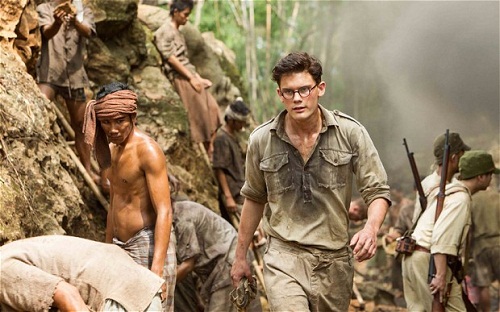
Firth did a great job as Eric Lomax in the WWII film, “The Railway Man”. The movie’s a little awkward but is still moving.
1980 – A man and a woman, both train passengers, started chatting. As he leafed through beaten timetables, one can see that he is a train enthusiast, he train geek even.
He then looks at her and says:
“If you think Warrington’s interesting, you wait till you get to Preston.”
The woman lets out a lovely smile. And on the way to their trip to Scotland and a few long hours of talking to each other, they fell in love.
This may be an ideal opening scene found in romantic movies yet, it is how the WWII film The Railway Man is opened.
The Railway Man retells the life of WWII veteran Eric Lomax, most specifically his memories as prisoner of war in Burma and his experiences as part of the construction of the Burma-Siam Railway dubbed as “the death railway” by many, the brutalities he faced there in the hands of the Japanese and a certain Takashi Nagase, the interpreter, who Eric singled out as his chief tormentor; how the occurrence affected his life after war and how in his older years, he faced Nagase in a bid to move on and conquer his post-traumatic disorder.
Colin Firth played Eric Lomax’s character – repressed and contemplative, Firth played the character really well. in a medium that relies heavily on communication, Firth aced through being the uncommunicative Lomax that the one watching can really feel his inner struggles though no words had been uttered.
Playing Eric’s long-suffering wife Patti is Nicole Kidman. Throughout the movie, Kidman gives off that warmth that turns this supposedly history-centered film into a love story between a man fighting against his demons and a woman willing to go to extremes to free him from them.

In the course of the film, Kidman learns of Firth’s sufferings while a POW in Burma and she helps him to face them head-on.
Kidman, as Patti, enlists the help of a former comrade of Firth as Lomax, Finlay who is played by Stellan Skarsgaard. Firth, on the other hand, reveals to the audience his past through flashbacks in which Jeremy Irvine, who starred in another war film the War Horse,plays the young Eric Lomax very convincingly.
Jonathan Teplitzky, The Railway Man’s director, did not shy away but rather did an amazing job showing the horrifying state of a Japanese labor camp in WWII. He did dramatize on the settings, though, as he conjured the dangerous Thai jungles as vibrantly picturesque while the safe Berwick-upon-Tweed in the Eighties as dull.
The film’s central theme, like the 1950s war movie Bridge on the River Kwai, is about a bridge though it is not a literal one but a connection between two absolutely different worlds.
And though The Railway Man is very moving to watch, it is not without flaws. Its story moves in a rather lumbering fashion and in some way, the later confrontation that happened between Lomax (Firth) and Nagase (played by Japanese actor Hiroyuki Sanada) lacked the intensity that should have been there considering the hatred the former had kept for a long time against the latter.
As it is a central moment in The Railway Man, it should be filled with tension but then, it’s not. This could be because Nagase’s character as the main antagonist was not established earlier in the film (younger Nagase was played by Tanroh Ishida), thus, the one watching it hasn’t developed the hatred that his character deserves.
Flaws aside, The Railway Man is one admirable movie.
It makes use see two things.
Firstly, it gives us a better insight about the psychological effects of war on those who had participated in it, specially the soldiers who were captured and suffered as POWs.
Secondly, it helps in explaining why then British Prime Minister Winston Churchill called the Fall of Singapore when about 200,000 men of the Allied Forces fell into the hands of the Japanese “the greatest disaster ever to have befallen the British Empire”. That is because that one disaster brought about other 200,000 personal tragedies.
Fortunately for Eric Lomax – who was able to personally supervise the production of The Railway Man until his death in 2012 – he was able to exorcise most of the demons he had when in war and overcame his personal tragedy. The unwavering love of his wife Patti had played a great and vital role in that.